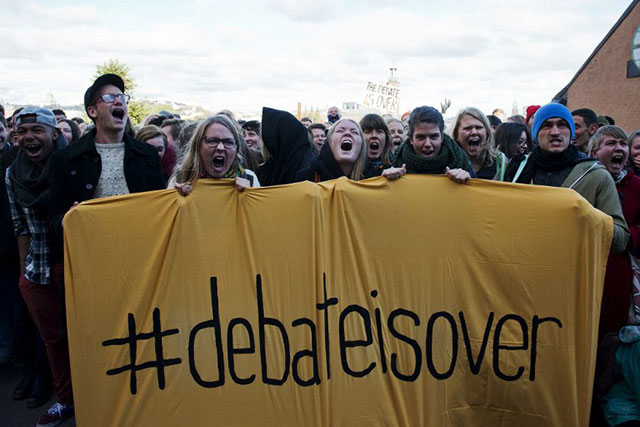SUMMARY
This is AI generated summarization, which may have errors. For context, always refer to the full article.

STOCKHOLM, Sweden – Scientists, environmentalists and politicians reacted with concern Friday as a UN climate panel warned temperatures could rise by as much as 4.8 degrees Celsius (8.6 degrees Fahrenheit) this century due to man’s voracious energy consumption.
“Yet another wake-up call,” was how US Secretary of State John Kerry described the report by the Nobel-winning Intergovernmental Panel on Climate Change (IPCC), which also underlined the peril of heatwaves, drought and floods and warned sea levels could rise by as much as 82 centimeters (32.8 inches).
READ: Kerry welcomes UN climate report, urges action
“Those who deny the science or choose excuses over action are playing with fire,” Kerry said in a statement.
The strongest scientific consensus yet that human activities drove warming since the 1950s, the report said heat-trapping greenhouse gas emissions must be urgently curbed to limit further damage to the climate system.
READ: Warmer Earth, humans to blame – UN panel
UN climate chief Christiana Figueres said the document’s release in Stockholm was “an alarm clock moment for the world”.
“To steer humanity out of the high danger zone, governments must step up immediate climate action” to meet the UN target of 2.0 C (3.6 F) from pre-Industrial Revolution levels, she said. This is the ceiling at which many experts believe the worst climate fallout can be skirted.
Based on computer models of different emissions trajectories, the report’s most optimistic scenario projects average warming of 1.0 C (1.8 F) by 2100 over 2000 levels — ranging from 0.3 to 1.7 C (0.5-3.1 F).
Previous research said global carbon dioxide (CO2) emissions, constantly scaling new highs, must peak around 2020 and then decline sharply for the lowest warming scenario to be possible. The world emits about 50 billion tonnes of greenhouse gas every year.
The IPCC’s worst-case scenario projects average warming this century of 3.7 C (6.7 F) — ranging from 2.6 C (4.7 F) to 4.8 C (8.6 F).
“Without very strong cuts in emissions of greenhouse gases, we face huge risks from global warming of more than 2.0 C by the end of this century,” said British climate economist Nicholas Stern of the report.
Green groups said such levels threatened the livelihoods of fishermen and farmers, would leave millions hungry and exposed to extreme weather events, and risked engulfing entire communities in coastal areas or low-lying small island states.
“If we are to follow what the science says, then we have to stop investing in fossil fuels and increase investment in sustainable, renewable energy,” said a statement from seven non-government organisations including WWF, Oxfam, and the International Trade Union Confederation.
“A bleak and hopeless future is not a foregone conclusion, it’s a choice,” added Greenpeace campaigner Stephanie Tunmore.
The decade ending 2010 had already been the warmest on record, and marked by extreme weather events.
“We ignore these scientific warnings at our own peril,” said Andrew Steer, head of the World Resources Institute, a US-based think-tank. “Climate change is here and it’s advancing even faster than we realised.”
University of Leeds climate professor and report co-author Piers Forster said new data revealed that humankind had been causing 40 percent more warming than was estimated in the IPCC’s 2007 report.
“Over much of the world, extreme rainfall will be heavier and occur more often and unless we begin to dramatically change our ways, we could have up to one meter (3.25 feet) and growing sea-level rise by 2100,” he said.
In a video statement, UN Secretary General Ban Ki-moon said the report was “essential” for governments thrashing out an ambitious global deal on curbing greenhouse gas emissions that must be signed by 2015.
“The heat is on. Now we must act,” said the UN chief, who will host a summit next September in a bid to bolster commitment. – Rappler.com
Add a comment
How does this make you feel?
There are no comments yet. Add your comment to start the conversation.